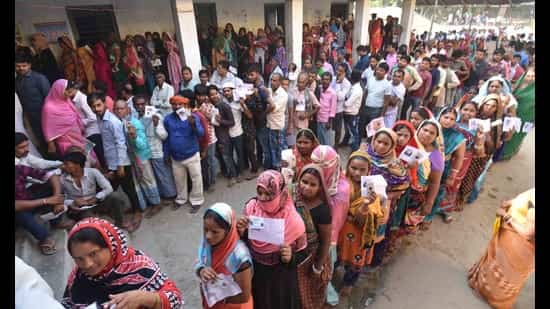Given that polls are held every year in some part of India, the upcoming polls in West Bengal, Assam, Tamil Nadu, Kerala and Puducherry can be seen as yet another component of India’s dynamic democratic cycle.
But these elections, arguably, have much greater significance than usual. The polls are happening in the backdrop of a turbulent time in national politics where structural changes are underway; the poll results will determine the trajectory of India’s national and top regional parties; they will, therefore, also have an impact on the nature of the federal structure that underpins the constitutional order in India; and each state has gone through a challenging time, in terms of both politics and governance, and the outcome will reflect how voters perceive the performance of the state governments in dealing with these challenges.
To begin with, while there is now overwhelming evidence that state elections are fought and won on state-specific leadership and issues, they cannot be divorced from the larger national backdrop. There are three specific national-level changes, which will have an impact on state polls.
The first is, of course, Covid-19. The pandemic disrupted lives and livelihoods, changed the nature of political communication, and highlighted issues which, so far, had not been at the heart of the electoral discourse — including health care. The elections will show if Covid-19 has forced a change in the way parties reach out to voters and the way in which voters decide on their choices, or whether the pandemic has, actually, not changed older political patterns. The second is the direction of economic reforms the government has undertaken. While this remains at a preliminary stage — the Centre’s moves on privatisation, for instance, have not been operationalised yet — there is now a clear sign that the government will push through liberal economic measures, which cater to the market and private sector. It is too early to link any electoral outcome to this new direction, but the farm laws and the protests around it — which were geographically concentrated around north India, but had national reverberations — provide an early indication of the political passions around reforms.
And finally, in three of the five states going to polls — Assam, West Bengal and Tamil Nadu — domestic politics has a strong external dimension. The debate around the immigrants, the Citizenship (Amendment) Act (CAA) and the National Register of Citizens brings Bangladesh into India’s domestic discourse, while the debate around Tamil rights in Sri Lanka, has an impact in Tamil Nadu. The outcome of the polls will have an impact on all these dimensions — how India’s political structures will adapt to a post-Covid-19 world; how India’s economic reform trajectory will proceed; and how India will navigate ties with the neighbourhood when the lines between the external and internal get blurred.
These polls also matter because they will shape the political future of a range of parties. For the Bharatiya Janata Party (BJP), the ideal scenario is retaining power in Guwahati, getting to the seat of power in Kolkata (the big prize), having an ally govern in Chennai, squeezing through as a part of a ruling coalition in Puducherry, and expanding its presence in the assembly in Thiruvananthapuram. If this happens, expect a more confident Centre, which will pursue its political and ideological agenda with renewed vigour; and even if the BJP succeeds in just winning the east while making limited forays into the south, it will see this as a political vote of confidence.
For the Congress, the ideal scenario is winning back Assam from the BJP on the plank of its opposition to CAA, ensuring that the Dravida Munnetra Kazhagam-led alliance returns to power in Tamil Nadu, where the Congress has a respectable junior status in government, and proving a political point in Puducherry where its government was just ousted. In Bengal, the Congress wants to expand its presence, but while keeping the BJP out of power. But there is a paradox here — success for the Congress-Left Front will split the anti-BJP vote. So there is a clash between its local politics and its national ambition of weakening the BJP. But the most important state for the party is Kerala. For two years, Rahul Gandhi has claimed he is a mere Member of Parliament from Wayanad, and while recognising that polls will be fought on a range of local factors, Kerala will be seen as Gandhi’s test within the Congress.
For the regional parties, these elections hold huge significance. All eyes are on the Trinamool Congress (TMC) — and whether, after being in power for a decade and facing an aggressive BJP, which confounded pundits by winning 18 of the 42 seats in the state in 2019, Mamata Banerjee can retain power. A victory for her, in the face of the BJP onslaught, will boost the confidence of other smaller regional forces — and she can be expected to renew efforts to forge an anti-BJP national coalition.
For the DMK, out of power for 10 years in the state, and now without the guardianship of M Karunanidhi, the elections will determine the political future of MK Stalin and, determine, more significantly, whether the BJP can be kept out as a direct or indirect player in the state where there exists deep suspicion of its cultural and linguistic politics. For the All India Anna Dravida Munnetra Kazhagam, in the absence of J Jayalalithaa and the challenge from Sasikala, who is staking claim to the political legacy of the former CM, all hopes are riding on the incumbent CM’s governance record and support from the Centre. For the Left, Kerala remains the only state where it exercises power — and whether it can beat Kerala’s electoral dynamic of voting in alternate parties to power is the big test. And then there are smaller forces in each state — including Muslim parties in Kerala, Assam and West Bengal — who aim to expand their presence, although, in some ways, their presence enables the BJP to engage in the politics of polarisation.
The election outcome will then, have an impact on the federal structure. Over the past year in particular, the federal structure has come under strain. Non-BJP forces believe that a strong Centre, run by a hegemonic force, is undermining the constitutional structure by taking over state subjects and legislating on them, altering the financial structures which would enable states to perform effectively, and accumulating power while leaving responsibilities in the hands of states. The Centre believes that these grievances are a result of political opposition, and that whenever there has been a constructive suggestion by states, it has been taken on board. It is in this backdrop that a BJP win in Bengal and presence in government, directly or indirectly, in Tamil Nadu will strengthen the Centre’s hand — while a TMC win in Bengal and a DMK win in Tamil Nadu will strengthen the voice of states.
In the final analysis though, the elections will reflect voter satisfaction — or dissatisfaction — with their respective state governments at a time of unprecedented suffering due to the pandemic and associated economic costs. Sarbananda Sonowal, Mamata Banerjee, EK Palaniswami, Pinarayi Vijayan and V Narayanasamy (who has now resigned) are on test. They will know how voters marked them on May 2.
letters@hindustantimes.com



































